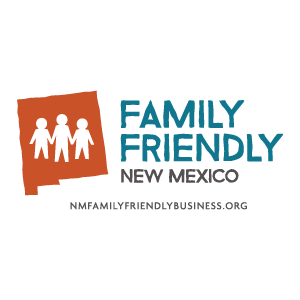Our mission at Family Friendly New Mexico (FFNM) is to support businesses, their employees and families to thrive. Right now, businesses and non-profit organizations have moved into survival mode virtually overnight. FFNM supports a wide range of businesses and organizations of every size and from a variety of industries including food and accommodation, healthcare and social assistance, education, construction and government. These industries are all at the front lines of the coronavirus rapid response that we are adapting to on a daily basis.
Experts predict that the economic impacts hitting our personal and collective economies will be felt for months and possibly even years. What do businesses and organizations need to do to get through the next few weeks and what foundation needs to be put in place to help shore up our economic future? We know there certainly isn’t just a one-size-fits-all answer and we are offering some basics on how to weather the economic storm that we are all in.
As a business owner and a business consultant based in Albuquerque, I have spent the last twenty years working on and guiding others about business fundamentals. I know that all to often, bookkeeping and record-keeping are the least sexy tasks many start-up owners and creatives want to take on. In my own experience, they have proved to be the key to scaling and thriving in the good times and to survival in the economic downturns. My own family business has lived through the flying-high days of the early nineties, the aftermath of 9/11 and the 2008 recession. Through it all, we have relied on four fundamental principles: know your numbers, sell what is closest to the cash, stay nimble and keep communicating!
Know your numbers.
As we are now learning the details of the recently enacted Coronavirus Aid, Relief, and Economic Security (CARES) Act, it is imperative that businesses and organizations “know your numbers” in order to be able to access some of the relief funds that are being made available on both national and local levels. Bookkeeping and tracking financials do not have to be complicated and for those micro and small businesses that don’t have a financial team to do this, there are many business resources to help you get the very basics down on paper. Do this NOW.
Start gathering all of the data that shows how much you own (assets) and how much you owe (liabilities); how much money comes in (sales or income) and how much money goes out (what you spend to make what you sell & what you have to pay regardless of sales, such as rent, utilities, employees, advertising, etc.).
For many who don’t have a bookkeeping system, that will mean using bank statements. Start categorizing all income (sales) into categories (this will help you determine which categories are easiest to sell), and categorize all expenses as well (list all of your sales first, then your expenses). If you are using a bookkeeping system already, start by printing a Profit & Loss statement and a Balance Sheet.
Once you have gathered your data and reports, consider using a simple budget projection or cash flow projection worksheet to help you determine what your ending cash balance will be every month for the next 6 months. This is a worksheet that you will return to day by day and week by week. It’s important to use this as a guide and adjust as you gather more data each day. Made a sale? Great! Add it to the worksheet. Projecting can be a challenge when the economy is humming and it can seem impossible in the economic churn that we are currently in. Give this thought, sit with it, and reach out to free resources that are available right now to help you put this together. If you are going to access grants, low-cost loans and federal aid, all of the applications are going to ask for financial information. Make sure you have it!
What can you sell now?
Next, start looking at what sales you can still make that are “closest to the cash.” What exactly does that mean? These are sales that are one-step and two-steps away from actually closing. If you are a non-essential business can you sell online or change up your offerings? If you are an essential business, how do you need to pivot to create sales. Restaurants are pivoting right now to provide meal prep, take-away, and getting creative and installing overnight pick-up windows where none existed before. Nonprofits are starting to offer services online (many are free but some have a small fee to help support their budgets), gyms and yoga instructors are offering Zoom classes, all sorts of businesses are selling gift cards for future sales. If you do sell gift cards, be sure you get help understanding that gift cards are cash in but not exactly “income” — ask your bookkeeper, advisor or CPA how to track this in your records.
Get creative and be willing to try new things.
Staying nimble can mean a lot of different things, depending on what type of business you are in. If you are able to keep your team in place, start asking for any and all ideas on creative ways to make it through this shift. Many businesses have made the shift to working from home. If you are managing a team that is able to do so, it’s important to remember that right now it’s not about the hours spent working but about completing benchmarks and goals. We all need flexibility to allow our creative and productive parts of our brain to function at their peak times — this may be early in the morning for some, late at night for others. Work with your team to set goals and give them the tools and support they need to reach those goals. Adjust when needed but keep working positively toward the outputs of your business or organization.
Stay in touch.
Communication is key during stressful times. Do everything you can to communicate with your customers, clients, employees, managers, vendors, suppliers, landlords/tenants, and advisors, especially your bank. Now is the time to start looking at whether your business needs to request a “financial forbearance” to keep cash positive at the end of each month over the next few months (remember your cash flow projection?) Can your credit card company allow you to skip a payment? Will your bank provide a three-month moratorium on your loan payment? Now is the time to ask. When you get an answer, go back to your cash flow projection and reflect it there.
Also, be sure to assess if the terms of the forbearance are reasonable and won’t add a huge burden later on. Be sure to ask for the terms in writing. When considering whom to ask for financial forbearance, keep in mind that, right now, our banking system is not in jeopardy but the local, independent vendor is. Take advantage of every forbearance offered by local governments. The state of New Mexico is allowing time to pay on payroll withholding, but it is imperative that you know how you will pay this once the economy starts moving again so that you don’t get behind on paying payroll or sales tax.
Communicate with your customers/clients. It doesn’t have to be lengthy and it’s helpful to stay consistent. Do you have an email list, social media channel or blog? If not, start one channel and use authentic language to tell your customers what’s happening for you. Are your hours changing, are you offering something new, do you have resources to share? Don’t worry about being perfect in your communication. Just start and be authentic.
Keep your employees up-to-date on what’s happening in your business/organization as well. Now is not the time to keep them guessing. You may need to update them on a daily or weekly basis as things are changing so incredibly rapidly. It’s heartbreaking to all of us that so many people are being laid off right now. Start working on your plan for what will happen when you will rehire. What will your “re-onboarding” plan look like? Are there family friendly policies that you will be able to incorporate into your standard operating policies, like flex time and working from home?
No one can predict the future but we can use the information we have right now, maintain the vision and work on a plan for coming through this, together. Family Friendly NM is here to support you during this challenging time.
*Note, this blog post will be updated with additional resources as they become available — bookmark it for future reference.
RESOURCES:
City of Albuquerque – Micro Business Relief Program [funding expended]
State of New Mexico Economic Development Dept. Resource Guide
New Mexico Business Owners Helping Business Owners
Albuquerque Business Roadmap from City Alive
NM Small Business Resource Guide from ABQ Business First
Emergency Loan Guide & Checklist from the U.S. Chamber of Commerce
Crisis Communication Plan from SCORE
COVID-19 Small Business Resources Guide from SBDC
Disaster Loan Assistance Information from SBA
Alice – COVID 19 Business Resource Center
Free ABQ Images (the image from our post is from this site)
About the author:
Julianna Silva

Julianna is a native New Mexican committed to helping New Mexicans realize economic vitality through her work to support both small business ownership and policies that enable families to thrive. A graduate of the UNM Anderson School of Management, she forged her path in entrepreneurship from her own consulting practice, co-ownership of a family business and by leading key initiatives at WESST. As Chief Operating Officer at Family Friendly New Mexico, Julianna collaborates with the CEO and staff to develop and implement operational infrastructure designed to achieve the FFNM mission to support businesses, their employees and families to thrive.

